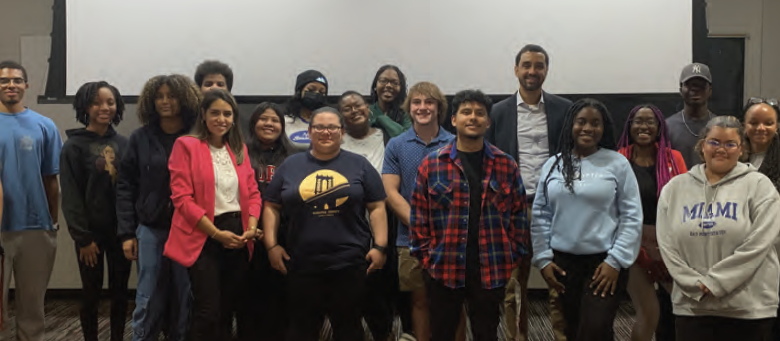
‘Making Connections’ gives guidance to underrepresented students
By Julia Train
IN January, Rider received over $20,000 from Janssen Pharmaceuticals and launched the “Making Connections” program in order to support underrepresented students in science, technology, engineering and math, also known as STEM majors.
Once a month these students, called Janssen Scholars, are able to listen to professionals in a variety of scientific fields talk about their career journeys and give advice during what’s called the “Making Connections Speaking Series.”
Kyle Houser, the coordinator of STEM student success, along with two science students, planned the series, which aims to introduce individuals from historically underrepresented groups to a plethora of careers in the field.
“We asked the students who they’re interested in hearing from at the start of the semester, and then we tried to find people who lined up with this,” said Houser. “One of the reasons that we started this project was to give students more people who they could hear from about careers in science and also how some of the information that they’re learning about in the classroom is applied in real world contexts.”
So far, the speakers have mostly been medical personnel of different levels, researchers and professionals with a variety of science backgrounds, such as biology and chemistry.
They’ve welcomed recent graduates who are now working in research and community members in related fields who are employed at medical facilities like Henry J. Austin Community Health Center and the Children’s Hospital of Philadelphia.
The next speaker will be an athletic trainer from Rider.
“We benefit as much from the speaker events as [the students] do. It might not be related to what classes we’re taking, but it’s just as beneficial. [The speakers] always have good things to share … and they kind of tell us about what they did, how they were successful in their time or just the path that they took,” said Corrine Walton-Macaulay, a senior health science major and student director for the program.
Universities often host professionals from a number of fields to talk to students about their journeys and careers; however, what makes this series stand out is that it’s geared toward underrepresented groups.
In order to address that need, all of the speakers invited are either Black or Hispanic.
In its first year, the series’ primary target audience was Black and Hispanic students; however, this year it opened up to include first-generation and low-income students and those who have been historically disadvantaged in STEM fields.
Although Houser contacts the speakers, he has two student directors who reach out to their peers in the program.
The two directors, Walton-Macaulay and junior computer science major Michael Robinson, focus on building direct relationships with Janssen Scholars.
They’re paid to help plan and promote the “Making Connections Speaking Series” and conduct student outreach within the program, especially to those who are in introductory courses.
“If I were in that position [of being in those courses], I would want someone to help push me just because it’s not an easy major to be in,” said Robinson.
Robinson coordinates the program’s social media, which Houser and the two student directors are actively working on improving and reaching a wider audience.
He noted that although most of the speakers are in the life science fields, he still learned from them about networking and the internship process.
While Robinson focuses on the broader part of student outreach, Walton-Macaulay focuses on speaking directly to students.
In addition to attending “Making Connections” events, she reaches out to students, focusing on building a relationship, and makes sure they’re doing well in their classes.
“I feel like I could be a mentor towards those freshmen and be someone that they could look up to. A big part of what we do is trying to get them to realize what [they’re] learning in class is relevant … and getting them to see there’s people who look like [them] in these fields,” said Walton-Macaulay.


